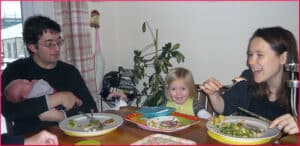
Here is a postscript to the discussion of the University of Michigan study of how mothers and children talk about food and eating, and how their actions reflect that communication. The researchers came to many conclusions that might uncharitably be labeled obvious, trivial or dull. A lot of factors can affect a project, like too small a sample size; a misunderstanding about what the aim should be; trying to discover too many things at once; or numerous other problems.
Regarding this food-talk study, it seems important to mention that such a task is complicated by the fact that the evaluations of families at the beginning and end of the test period depend on the Child Eating Behavior Questionnaire. Self-reporting is a weak spot in many research situations, and like others before them, these scholars realize that “there is some level of disconnect between observed and reported feeding behaviors.” They go on to say,
This is consistent with prior work that has found that a mother’s stated beliefs about her behavior often do not align with how she interacts with her child around food.
In discussing the possible shortcomings of this study, the authors wrote,
[I]n the current study we were unable to examine associations between food talk and food intake, as we did not assess what families were eating during the specific recording period.
As we did not compare food talk outside of mealtimes to food talk during meals in the current study, it is not known whether the amount and nature of food talk is similar across mealtime and outside of mealtime contexts, or whether associations with eating and feeding variables may differ across those contexts.
They also map out ideas for future studies, noting the importance of testing associations between food talk, maternal feeding practices, child eating behaviors, and weight status. They also stress that findings cannot really be deemed “robust” unless planned studies are able to include larger samples.
Dr. Pretlow’s Upcoming Appearance
In two months, the World Obesity Federation 2019 Regional Conference will take place in Muscat, Oman, where Dr. Pretlow will give two lectures on December 5. This event is attended by scientists, medical professionals, and researchers from more than 50 regional and national obesity associations.
Dr. Pretlow will discuss contributory factors to the increase of obesity and type 2 diabetes in the Persian Gulf region. He says,
It seems analogous to the high obesity rate and type 2 diabetes in Native American tribes. Native Americans lost their culture due to influx of the white man’s culture. Of course they were conquered, but I still think there are parallels in the Persian Gulf countries. Due to discovery of oil in the late ’60s, there are now more foreigners in Persian Gulf countries than natives. The Director of the National Diabetes Center in Oman told me that much of the population sit inside their air conditioned villas, watch cinemas, and eat. With casino revenues, Native American tribes now have ample money, e.g. for healthy food, but obesity persists.
Dr. Pretlow will also discuss displacement activity as the basis for addiction, including overeating and obesity.
Alert! Alert! Alert!
Most of us probably haven’t done much about Halloween yet, and there is enough time to absorb some ideas, and act on them. Rather than crowd up this page with a million links to our extensive seasonal research, you just go up to your search box on any Childhood Obesity News page and type in Halloween.
Your responses and feedback are welcome!
Source: “Family food talk, child eating behavior, and maternal feeding practices,” NIH.gov, 06/03/17
Photo credit: Christine McIntosh on Visualhunt/CC BY-ND

 FAQs and Media Requests:
FAQs and Media Requests: 











